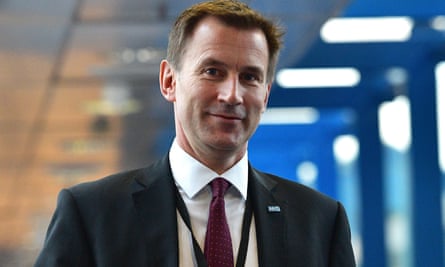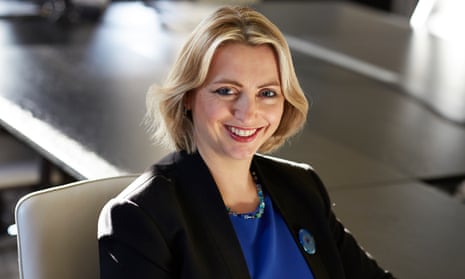‘ This is a scary world,” says Dr Helen Stokes-Lampard, the new leader of the UK’s 49,439 GPs. She is not referring to soaring obesity, or the fact that dementia has replaced heart disease as the nation’s biggest killer, or the truth that everyone’s risk of getting cancer has recently gone from one in three to one in two. She’s talking about social media, its downsides and its contribution to ill-health – mental ill-health specifically – and how more and more of its victims are ending up in GPs’ consulting rooms.
“I wouldn’t want to be a teenager nowadays. The social media pressures are phenomenal. People have become more judgmental about appearance. If I was a chubby teenager, the only people who knew were those around me. But now strangers on the other side of the world have a view on how teenagers look. Can you imagine how awful that must be? Unless you’ve got incredible resilience then that puts you at real risk. It grinds people down. It’s the inexorable pressure to be perfect,” adds Stokes-Lampard, who became the new chair of the Royal College of GPs this weekend.
Instagram and Snapchat are the two biggest facilitators of this worrying trend, she says. “You get eight- or nine-year-olds coming in worried about how they’re looking, and nine-year-olds talking to their parents but not wanting to eat because the food’s fattening. That makes my skin crawl; that’s a real cause for anxiety for us all. Social media’s created a new set of norms and values and we’ve not given our children the resilience and wisdom to know how to use these things safely.”
Family doctors now see depression in prepubescent children who have been bullied – cyber-bullied – because they have freckles, wear glasses or are overweight. “So there are clearly negatives from social media and technology,” she says, before adding, laughing: “Says she – who loves Twitter.”
Stokes-Lampard, 46, is what she calls “a coalface GP” in Lichfield, Staffordshire – “a very normal practice full of very normal people” – though her new role will limit her to just one day a week in her surgery. Reflecting on the changing nature of illness, she says that these days “obesity pervades the consultation. At least half of consultations I have are with people who are overweight, because society is overweight; real, normal people are overweight. It impacts on people’s health in myriad ways. There’s the obvious stuff – it can affect your breathing or joints, give you diabetes or increase your risk of cancer. But people’s self-worth and their mental health is dragged down when their body shape isn’t right because we’re, you know, an incredibly fat-shaming society.”
Family doctors can do only so much, Stokes-Lampard explains in a soft south Wales accent that indicates her upbringing in a mining village just outside Swansea. Doctors identify a patient’s condition and draw up a plan, but often other health professionals then need to take over, she adds. She laments the NHS’s postcode lottery in the specialist services to which GPs should be able to refer patients with a range of problems, not just dangerous obesity. It limits GPs’ ability to help and may reduce someone’s chances of recovery.
“We’ve got so many problems of where to refer patients on to, the next tier of our referral services – our physiotherapists, our memory clinics for people with dementia, [and] weight management services. It’s a big problem. If we’ve got nowhere to help, to channel these people to, they get stuck with us, and that’s not necessarily the best place for patients.”

The media and political focus in the past year or two has been on the UK-wide shortage of GPs. “But we need more practice nurses, far more district nurses and far more health visitors, far more community mental health support workers, far more CBT [cognitive behavioural therapy]. It’s been a chronic underfunding problem. So much resource and energy has gone into shoring up hospitals due to winter crisis and pressures in A&E but actually they took their eye off the ball in terms of the vital role of primary care in supporting the rest of the NHS.”
In England at least, though, Simon Stevens, the head of NHS England, has promised to send what the GPs’ leader only half-jokingly calls “the cavalry”. That should entail not just 5,000 more family doctors, but also 3,000 new mental health therapists who will be based in GP surgeries, 1,500 pharmacists who will also see patients there, as well as more practice nurses, “physician assistants” – who are meant to do some tasks usually performed by nurses or doctors – practice managers and receptionists.
They are all intended to help relieve the strain on GPs, who by common consent are struggling to keep up with the demands posed by our ageing, growing and increasingly medically complicated population. General practice will receive an extra £2.4bn a year by 2020-21 that will push its share of the NHS budget from £9.6bn to £12bn.
That pledge of 5,000 extra GPs was originally made by David Cameron before the 2015 general election. It remains a totemic Conservative promise, the missing of which would be very embarrassing. No one in the NHS thinks it will happen, though the health secretary Jeremy Hunt is still gamely insisting it will be met. Stokes-Lampard is understandably sceptical. “We’re concerned about the 5,000 GPs. It’s a good pledge but it’s not going to be met at the moment. Things are moving too slowly to reach that level by 2020, so it’ll take a big concerted effort by a lot of people to push us from the amber, which is where I think we are now on that, back into the green.”
She is worried that few if any of the 500 extra GPs that were meant to be coming from abroad to help meet the 5,000 target have actually come. For example, despite publicity months ago announcing the imminent arrival of family doctors from India, none is here yet. Brexit seems to be a factor, she says. “Inevitably we’ve already had doctors [overseas] saying to us, ‘I’d like to come but actually I’m not sure what the visa situation’s going to be in a few years’ time and, well, I don’t want to bring my family over, start a new life and discover I’m not welcome.’ So we need to change the language.” The government’s Migration Advisory Committee could help by adding GPs to its list of shortage occupations, just as they did with nurses earlier this year, and thus make it easier for family doctors from around the world to come here, she suggests.

Even if all the pledges by Stevens and Hunt to improve the lot of GPs are delivered, she fears that will not be enough to enable them to cope with the growing volume of illness. She wants to see big changes in public health policy – the sugar tax, minimum unit alcohol pricing – and for everyone to become more active. “We need to make it easier for people to be healthy. We need to make walking the new norm and to have more cycleways. Kids used to walk to school, but now there’s a culture of being chauffeured. People think it’s safer but it’s not. The evidence is increasingly that it’s the sofa that kills you, not the eating. Inactivity underlies a lot of problems. Being more active helps with our weight, our wellbeing and our heart.”
Better diet, including eating less meat, would also help prevent illness, she says. “I say this as someone who loves meat, so I’m not being hypocritical, but we need to change the culture of meat and two veg being the staple diet in the UK. We definitely need to eat less red meat and processed meat. Meat should be a treat, not part of every meal.” Consuming more white meat and fish, especially oily fish, would help reduce the risk of certain cancers, she says. She also advises cooking meat ourselves rather than buying pre-cooked joints, and eating it no more than twice a week.
So there is the nation’s health, an issue as always for the gatekeepers to the NHS. But she is also determined to do what her office allows – through lobbying ministers and arguing her case on TV and radio – to improve the health of Britain’s general practitioners, or “expert generalists”, as she calls them. A friend – a 38-year-old female GP – recently packed in the profession when it all got too much and her relationship with her partner and children began suffering under the weight of the constant stress, 14-hour days and endless workload family doctoring involves. “She cracked.” Another has recently emigrated to Australia in search of a better work-life balance.
“General practice is closer to the precipice than it’s ever been in living memory. The NHS is its people,” Stokes-Lampard adds. “If you take them for granted and don’t value what you’ve got, once they’ve gone it’s so, so much harder to come back from that brink.” Minister, take note.
CV
Name Dr Helen Stokes-Lampard
Age 46
Born Swansea, south Wales
Educated Comprehensive school in Swansea, then St George’s medical school in London.
Career Worked in obstetrics and gynaecology before becoming an academic GP and has been a GP since. Until September was head of primary care teaching (undergraduate) at Birmingham university’s school of medicine. Held various roles in the RCGP, including council member and treasurer.
Roles Chair, Royal College of General Practitioners (2016-2019) – the third woman in a row to hold the post after only men for the previous 50 years; GP partner (part-time) in Lichfield, Staffordshire.

Comments (…)
Sign in or create your Guardian account to join the discussion